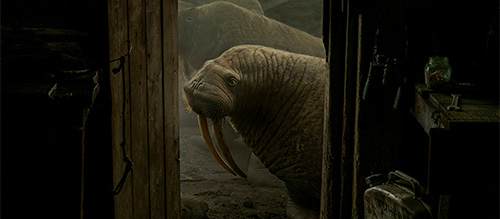
Haulout (2022)
Directors: Maxim Arbugaev, Evgenia Arbugaeva
Starring: Maxim Chakilev
The Siberian Arctic. A dense ocean mist engulfs the horizon, covering sea, sand and objects in a deep grey. What’s beyond this place could be anyone’s guess. Then a man, armed with stick in hand, walks into shot. It’s like something from the pioneering early documentary film Nanook of the North, an experience of peering through something to see someone just out of view. The film lingers, the ocean swirls, we hear waves crashing, then water trickling down a new landscape, this one of rocks. “September 7”, reads the man to a radio, his body a silhouette against the coarse grey backdrop of clouds that engulf his presence at the top of a cliff. “Dense fog. Can’t see them yet.” It’s almost post-apocalyptic.
Alone, amongst a desolate landscape, he takes shelter in a wooden shack not too dissimilar to Charles Chaplin’s in The Gold Rush, his one person dinner table and dilapidated coffee mug framed beside the window like the one in Andrei Tarkovsky’s Stalker. Soon after, we see the man peering into the dark of his cabin at night, torch on head. We hear the wind creak the wooden structure of the house, it growling like a bear, the creaks of wood under foot invasive to our ears just as man is invasive to such an environment. He opens the door. Suddenly, thousands of walrus – mounted side-by-side and on top of one another – immediately outside. It’s like something from a horror film, like Robert Eggers’ The Lighthouse: a fever dream, a nightmarish moment of awakening.
This is Maxim Chakilev, a wanderer of the Siberian arctic, a marine biologist who measures walrus migrating patterns. He estimates that there are 95,000 walrus on the beach directly outside his accommodation, 6,000 more in the water. The more walrus there are, the more dangerous it is for the walrus themselves. As title cards later reveal, such an event is named a “haulout” (the title of the film), and is indicative of when walrus are unable to take rest on sea ice during their migration. When on land, they are more at risk. At risk of predators hardly, more of panic, exhaustion and stampedes. In 2020, he counted 600 walrus to have died on the beach he overlooked.
Haulout is a fundamentally cinematic experience. Every frame is still, boxed, like a timeless photograph of a netherworld. It’s like silent cinema, evocative of Nanook. Only 8 words are spoken across the opening 9 minutes of the film, and only several more for the remaining 15. The visuals tell the story.
We see a walrus scare itself when trying to climb into the shelter, its paw knocking down a metal container. We see another, this time a baby, sneak into the sheltered outdoor area soon after Chakilev has attempted (and failed) to seal it off with a wooden plank. These are huge, intimidating animals, but they seem investigative, sadly anxious.

The camera’s stillness paints the picture of an opposite viewing gallery, one in which we are the observed. The frames of the wooden hut are used as visual frames, the mountainous walrus passing by to take a look. It’s less that we are observing them, and more that they are observing us; a human zoo.
Documentary filmmaking has rarely been this utterly astounding cinematographically. The frames and the composition are at times breathtaking, one shot in which the camera peers inside through a window lit by a fire being timelessly evocative. The sound design is utterly tremendous too, its attraction to the sounds of the walrus themselves indicating a respect for the majesty of these unique creatures and the trying circumstances that have brought them to this place.
As a product of cinema – and Haulout is certainly cinema – this is one of the great documentary projects of our time. A short film it may be, but no amount of time here is lost to meandering, the impact of big moments heavy and memorable.
Haulout’s lasting message is that the edges of the world are now as broken by us as the parts we know to have long been, and it’s a sobering message to receive. Life, even on the outskirts of existence amongst the fog and the cold and all the power of the ocean, is struggling at our behest. For this, and the ways in which it magnificently brings such a unique story to life, Haulout must be seen as the extraordinary documentary of the Oscars’ Documentary Short Subject category in 2023, and an unmissable piece of documentary filmmaking for the entire 21st century. Truly, Haulout is a special film.
Score: 24/24
You can watch Haulout in full on YouTube courtesy of The New Yorker.

